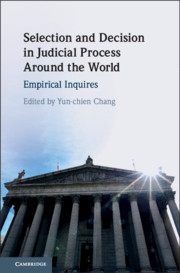Book contents
- Selection and Decision in Judicial Process around the World
- Selection and Decision in Judicial Process around the World
- Copyright page
- Dedication
- Contents
- List of Figures
- List of Tables
- List of Contributors
- Acknowledgments
- Introduction
- 1 Do Patent Law Suits Target Invalid Patents?
- 2 Platform Procedure
- 3 Speedy Adjudication in Hard Cases and Low Settlement Rates in Easy Cases
- 4 How Lower Courts Respond to a Change in a Legal Rule
- 5 Career Judge System and Court Decision Biases
- 6 Judges Avoid Ex Post but Not Ex Ante Inefficiency
- 7 When Winning Is Not Enough
- 8 The Evolution of Case Influence in Modern Consumer Standard Form Contracts
- 9 Judging Insurance Antidiscrimination Law
- 10 Are Judges Harsher with Repeat Offenders?
- 11 Does Efficiency Trump Legality?
- Index
- References
11 - Does Efficiency Trump Legality?
The Case of the German Constitutional Court
Published online by Cambridge University Press: 04 December 2019
- Selection and Decision in Judicial Process around the World
- Selection and Decision in Judicial Process around the World
- Copyright page
- Dedication
- Contents
- List of Figures
- List of Tables
- List of Contributors
- Acknowledgments
- Introduction
- 1 Do Patent Law Suits Target Invalid Patents?
- 2 Platform Procedure
- 3 Speedy Adjudication in Hard Cases and Low Settlement Rates in Easy Cases
- 4 How Lower Courts Respond to a Change in a Legal Rule
- 5 Career Judge System and Court Decision Biases
- 6 Judges Avoid Ex Post but Not Ex Ante Inefficiency
- 7 When Winning Is Not Enough
- 8 The Evolution of Case Influence in Modern Consumer Standard Form Contracts
- 9 Judging Insurance Antidiscrimination Law
- 10 Are Judges Harsher with Repeat Offenders?
- 11 Does Efficiency Trump Legality?
- Index
- References
Summary
The US Supreme Court has the power of certiorari. It may pick its fights. As a beneficial side effect, the court may allocate its resources, in particular the time and energy the justices spend on a case, to worthy causes. In economic parlance, this discretion makes the court more efficient. Efficiency comes at a political cost, though. This discretion also gives the court political power. It may direct its verdict to causes that are politically most relevant, or it may put an issue on the political agenda. Officially German constitutional law does not have certiorari. The Constitutional Court must decide each and every case that is brought. Yet over time the court has crafted a whole arsenal of more subtle measures for managing the case load. This paper shows that it uses these tools to engage in its version of allocating resources to cases. It investigates whether the ensuing efficiency gain comes at the cost of biasing the court’s jurisprudence. The paper exploits a new comprehensive data set. It consists of all (mostly only electronically) published cases the court has heard in 2011. While the data is rich, in many technical ways it is demanding. The paper uses a factor analysis to create a latent variable: to which degree has the court taken an individual case seriously? It then investigates whether observed indicators for bias explain this latent variable. Since the paper essentially investigates a single (independent) case, in statistical terms the findings are to be interpreted with caution. The paper can only aim at finding smoking guns.
- Type
- Chapter
- Information
- Selection and Decision in Judicial Process around the WorldEmpirical Inquires, pp. 261 - 286Publisher: Cambridge University PressPrint publication year: 2019

